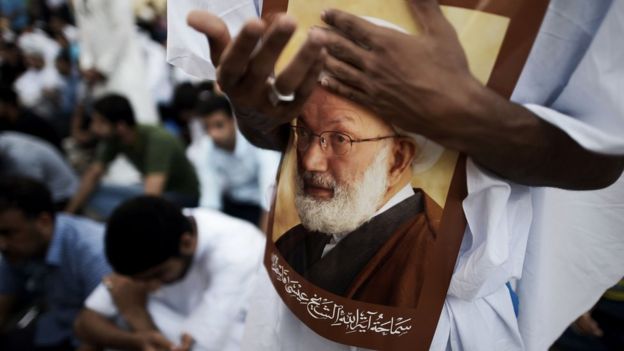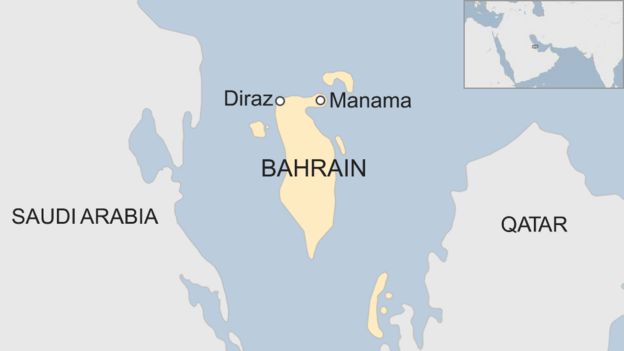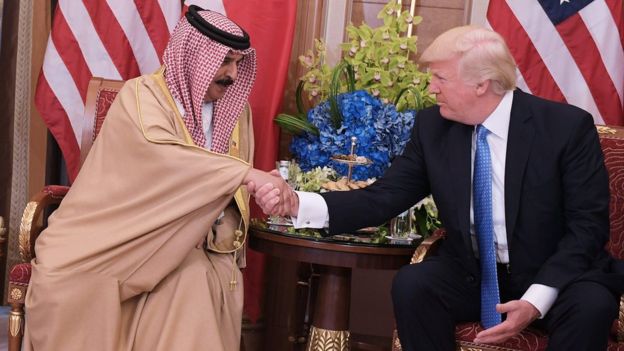The death toll from Tuesday’s raid by Bahraini police on the home of the Sunni-ruled kingdom’s most prominent Shia cleric has risen to five.
The interior ministry said 286 people were also arrested after officers came “under attack by members of a terrorist cell” in the village of Diraz.
Activists said the officers opened fire at a sit-in by supporters of Sheikh Isa Qassim, who was not detained.
It came two days after the cleric was convicted of corruption charges.
Sheikh Qassim was handed a one-year suspended prison sentence and fined 100,000 Bahraini dinars ($265,000; £204,000) after being found guilty by a court of collecting funds illegally and money laundering.
Last June, Bahrain stripped him of his citizenship, accusing him of using his position to promote violence.
The decision left him stateless and at risk of deportation, prompting the sit-in outside his home. Police responded by surrounding Diraz and restricting access.
An interior ministry statement said Tuesday’s operation was undertaken to “safeguard public safety”.
“During the operation, police authorities came under attack by members of a terrorist cell throwing fire bombs, metal rods, knives and axes forcing the security authorities to respond proportionately,” it added.
 Image copyrightAFP
Image copyrightAFP“A total of 286 arrests were made, including fugitives that had escaped from Jaw Prison. Several terrorists and convicted felons were also apprehended with a large number of them hiding in the residence of Isa Qassim.”
Nineteen officers were injured in the clashes and five deaths were “registered among the outlaws”, another ministry statement said.
Witnesses said the raid on the sit-in triggered clashes, with officers firing birdshot and tear gas at demonstrators throwing stones and petrol bombs.
Photographs and videos circulated by activists showed a bulldozer smashing through a barrier and youths climbing on an armoured personnel carrier.

The UK-based Bahrain Institute for Rights and Democracy said five peaceful demonstrators had been killed “in a heinous crime enabled by the unconditional support of the Bahraini rulers’ key allies in Riyadh, Washington and London”.
Amnesty International said one of those killed had suffered birdshot wounds to the head and called for an independent investigation into the police’s use of “excessive force” against protesters it said were mostly peaceful.
Human Rights Watch said “the timing of this operation – two days after King Hamad’s convivial meeting with President Trump – can hardly be a coincidence”.
At a summit in Saudi Arabia on Sunday, Mr Trump told Bahrain’s ruler that its relations with the US would not be put under “strain” as they were during the Obama administration, which criticised the kingdom’s human rights record.
 Image copyrightAFP
Image copyrightAFPA US state department official told AFP news agency on Tuesday that Washington was “concerned” by the reports of protesters’ deaths and called “on all parties to contribute to a climate conducive for dialogue and reconciliation”.
Bahrain has been wracked by unrest since security forces crushed pro-democracy protests mainly led by the majority Shia community during the Arab Spring in 2011.
King Hamad brought in troops from neighbouring Sunni-led Gulf states to end the demonstrations and restore order. The unrest left 30 civilians and five police dead.
Activists say dozens more people have been killed in clashes between protesters and security forces since then, while bomb attacks blamed on militants allegedly backed by Iran have killed a number of policemen.
The authorities have launched a wider crackdown on dissent over the past year that has included banning the main Shia political grouping, Wefaq, which was accused of fomenting sectarian unrest, and jailing its leader Sheikh Ali Salman.

